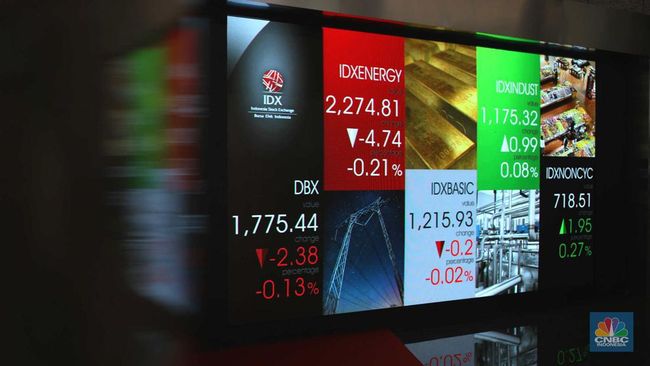Jakarta, CNBC Indonesia – The International Monetary Fund (IMF) warns that the global economy will face challenging times in 2023. In fact, a third of the world economy is in a recession.
The forecast was actually quite dire. The Jakarta Composite Index (IHSG) suffers. Indeed, yesterday the index hit its first deepest drop this year.
By close of trade yesterday, the index was down 75.52 points or 1.10% equivalent to a level of 6,813.24. The index stumbled on a number of large-cap stocks that also fell.
Though horrified, the prediction was not without reason. This is because the three main engines of the world economy, namely the United States (US), China and the European Union, will slow down.
“We estimate that one third of the world economy is in recession. Even countries that are not in recession will feel a recession for hundreds of millions of people,” IMF Chief Executive Officer Kristalina Georgieva said in an interview with CBS Face the Nation, quoted Wednesday (4/1/2023) ).
In China, China’s economic pace in 2022 is likely to lag behind global economic growth for the first time in 40 years due to a spike in Covid-19 cases, Georgieva said.
“For the first time in 40 years, China’s growth in 2022 is likely to be at or below global growth,” Georgieva said.
The increase in Covid-19 cases at least over the past year has forced the Bamboo Curtain country to implement a series of restrictions that have once again hampered economic activity.
Indeed, a new spike in Covid-19 cases in China in the coming months is likely to hit its economy even harder this year and slow regional and global growth.
“The next few months will be difficult for China and the impact on Chinese growth will be negative, the impact on the region will be negative, the impact on global growth will be negative,” Georgieva said.
In its forecast for October 2022, the IMF pegged China’s gross domestic product (GDP) growth last year at 3.2%, or the equivalent of the IMF’s global outlook for 2022.
Is the US Still Resilient?
Meanwhile, Georgieva said, the US economy is on the sidelines and can avoid the full-blown contraction that will likely hit a third of the world economy.
“The US is the most resilient, it can avoid a recession. We see the job market remains quite strong,” he said.
However, this in itself presents a risk as it could hamper the progress that the US central bank (Federal Reserve/The Fed) needs to make to bring US inflation back to the 2% target level.
“It’s a… mixed blessing because if the job market is very strong, the Fed may have to hold rates longer to bring inflation down,” Georgieva said.
Last year, in its most aggressive policy tightening since the early 1980s, the Fed raised the key interest rate from near zero in March to the current range of 4.25% to 4.50%. %, and last month Fed officials predicted it would cross the line. % by 2023, a level not seen since 2007.
Meanwhile, the US job market will be a key target for Fed officials who want to see reduced demand for labor to help ease price pressures.
Next article
Abandoned by foreigners, here is the mysticism of JCI today
(df/df)


